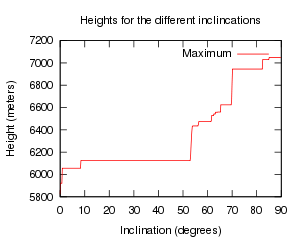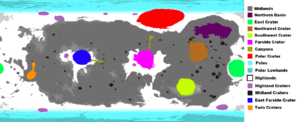Difference between revisions of "Mun/ja"
Kspjptrans (talk | contribs) (→バイオーム) |
Kspjptrans (talk | contribs) |
||
| Line 1: | Line 1: | ||
{{:Mun/Data}} | {{:Mun/Data}} | ||
| − | '''Mun'''(ムン)は時には'''Mün'''とも表記される、[[Kerbin]]周回軌道上にある比較的大きな[[:Category:Moons|衛星]]である。現実宇宙における月の類似物で、しばしば“[[w: | + | '''Mun'''(ムン)は時には'''Mün'''とも表記される、[[Kerbin]]周回軌道上にある比較的大きな[[:Category:Moons|衛星]]である。現実宇宙における月の類似物で、しばしば“[[w:ja:%E6%9C%88#.E6.A6.82.E8.A6.81|月]]”(ラテン語で''Luna'')とそのまま呼ばれる。 |
| − | 地表は灰色で、大小様々な[[w: | + | 地表は灰色で、大小様々な[[w:ja:クレーター|クレーター]]と標高5029mを超える[[w:ja:山|山]]が存在する。表面重力は1.63 m/s²でKerbinと比較するとおよそ1/6で8.18 m/s²の差がある。ちなみに現実の月の表面重力は1.624 m/s²である。[[Tutorial:Mun Landing|Munに着陸]]できるのはもちろん、[[Tutorial: Gravity Assist|重力アシスト]](スイングバイ)として[[Minmus]]や[[Kerbol]]などより遠い天体へ向かう軌道に乗ることにも活用できる。 though such maneuvers do not save very much fuel and are more imprecise. It is, however, useful for plane changes with proper timing. |
新規プレイヤーはMun(ほか大多数の天体)には[[atmosphere|大気]]が存在しないことに注意すべきだ。これは[[parachute|パラシュート]]が地表への着陸手段として使えないことを意味している。 | 新規プレイヤーはMun(ほか大多数の天体)には[[atmosphere|大気]]が存在しないことに注意すべきだ。これは[[parachute|パラシュート]]が地表への着陸手段として使えないことを意味している。 | ||
Revision as of 01:11, 5 September 2014
Mun(ムン)は時にはMünとも表記される、Kerbin周回軌道上にある比較的大きな衛星である。現実宇宙における月の類似物で、しばしば“月”(ラテン語でLuna)とそのまま呼ばれる。
地表は灰色で、大小様々なクレーターと標高5029mを超える山が存在する。表面重力は1.63 m/s²でKerbinと比較するとおよそ1/6で8.18 m/s²の差がある。ちなみに現実の月の表面重力は1.624 m/s²である。Munに着陸できるのはもちろん、重力アシスト(スイングバイ)としてMinmusやKerbolなどより遠い天体へ向かう軌道に乗ることにも活用できる。 though such maneuvers do not save very much fuel and are more imprecise. It is, however, useful for plane changes with proper timing.
新規プレイヤーはMun(ほか大多数の天体)には大気が存在しないことに注意すべきだ。これはパラシュートが地表への着陸手段として使えないことを意味している。
There are anomalous geological formations that can be found on the surface of the Mun. To preserve the enjoyment of exploration for new players, those who have found these sites are encouraged to keep their exact coordinates secret.
Munの同期軌道は高度2 970.58 kmにあるが、すでに重力圏外なため維持することは不可能である。However, putting your spacecraft just outside Mun's SOI and having the same semi-major axis would make it appear stationary. 標準的な高度25 kmまで上昇するには800 m/sのdelta Vが必要である。なお準同期軌道は高度約1797.41kmである。
tutorialにて月面旅行を解説している。
Contents
ゲーム内の説明
| 「 | MunはKerbinの周りを回る大きな衛星である。灰色の天体で平坦な一部いがいは大小さまざまなクレーターに覆われている。
Munでの新発見は緑進化の謎を解明する重要な糸口になると広く考えられている。 Granted it didn’t happen all that long ago, but its still fair to say that Kerbals are wiser and more evolved now than they were back then. — Kerbal天文学会 |
」 |
地勢
Munの地形は荒く、灰色で、クレーターがはっきり残っているのが特徴だ。低地は表土がより濃い灰色になる傾向がある。Munにも峡谷が存在しておりその深さは数百m、全長は数kmに及ぶ。
Mun地形の最高高度地点は南極近くの西経152.33°南緯82.52°にあり、7061 m以上の高度がある。この高度では10倍速ワープが可能だが、 allowing crashes with terrain while being in a seemingly stable orbit.最低高度地点は北の大クレーター南西よりの西経76.63°北緯35.32°で高度は-247 mである。
地表の細部要素はグラフィック設定により岩や小石が出現する。他惑星の細部要素と同様にMunの岩なども当たり判定のない装飾で宇宙船や緑が引っかかることはない。
As of 0.21 the Mun is peppered with procedural impact craters making Mun landing more difficult. Previously the lowest point with an altitude of 0 m was on the east side of a large crater, at 35.42° E, 8.27° N.
The Hell Kraken has been encountered on the Mun, with objects being thrown out of Kerbin's sphere of influence upon reloading the craft.
The Mun also has several hidden surprises for explorers to find:
- 大きな石のアーチが3つある。その大きさから赤道付近を高度10000m以下で周回していれば容易に発見できる。
- 人類最初の月面着陸者Neil Armstrongの記念碑が建っている。 It can be found inside one of the largest craters, near the south wall. この場所はアポロ11号が月に着陸した地点とほぼ一致している。低軌道から白い点として微かに視認できる。
- モノリス(捩ってMunolithとも)が3つある。モノリスは小さく、発見するのは非常に難しい。ひとつは地中に、残り2つはそれぞれ非常に深い縦穴の中にある。
- There are several other secrets on the Mun for the dedicated observer. Look around!
バイオーム
version0.24.2現在[outdated]、Munはバイオームが実装された数少ない3天体(Kerbinとその衛星Mun・Minmus)の1つである。さらにKerbol系15の天体にあるバイオーム総数のうち大部分を占めている。主要な大型クレーターはそれぞれ独自のバイオームとなっており、個性はないが固有名称が与えられている。MidlandsやHighlandsに存在する中型クレーターには固有名称は無いものの、各バイオームのクレーターとして別に扱われている。極地には3つの異なるバイオームが存在している。Munに分布する全バイオーム:
- Midlands
- Northern Basin
- East Crater
- Northwest Crater
- Southwest Crater
- Farside Crater
- Canyons
- Polar Crater
- Poles
- Polar Lowlands
- Highlands
- Highland Craters
- Midland Craters
- East Farside Crater
- Twin Craters
Kerbinからの観測
Munの軌道はKerbinの赤道面と一致している。Munが潮汐固定(自転周期と公転周期が一致)されていること、軌道が完全な円であること、軌道傾斜が無いことから、Kerbinから観測できるMun地表は常に同一のちょうど50%(山陰など地形に起因するものは無視する)のみである。
軌道傾斜が無いためMunがKerbinと太陽の間を通過するたびに日食が発生する。グラフィックエンジンの制約から現在、日食による暗転や影の発生はしない。しかし太陽光発電機はMunの影に入る短時間だけ日光が遮断され機能しなくなるだろう。
Kerbinの観察
潮汐固定のため、Mun地表のうちKerbinに面した50%でのみ観察することが出来、残り50%ではその姿を見ることは絶対に出来ない。Kerbinを天頂で観察できるのはMunの東経でおよそ47°の地点である。Munの赤道はKerbinの赤道と同一平面上にあるため、Munの赤道上にいる限りKerbinの赤道面にいることになる。KerbinはMunから潮汐固定を受けているわけではないため、Munのうち観察できる50%側であればKerbin全ての地表を観察することが可能で、裏側であってもKerbinの自転にあわせて観察できるようになる。KerbinとMunの朔望周期は25617.909秒で、Kerbol太陽日(1日約6時間)では1.18323日である。
サイエンス
Munにおけるサイエンスポイント乗数は他の天体に比べ、地表上空いずれもかなり低い設定になっている。しかしMun到達は比較的容易であり、多数のバイオームはそれぞれ別の実験結果を得ることができる。そのためゲーム中盤ではMinmusと並び重要なポイント獲得源となる。
時間加速
| 時間加速中 | 最低高度 |
|---|---|
| 1× | どこでも |
| 5× | 5 000 m |
| 10× | 5 000 m |
| 50× | 10 000 m |
| 100× | 25 000 m |
| 1 000× | 50 000 m |
| 10 000× | 100 000 m |
| 100 000× | 200 000 m |
Gallery
- Error creating thumbnail: File missing
Four kerbals manning a Mun base
Trivia
- After its implementation, many fans began calling the body Mün, pronounced the same as "moon", believing the original spelling to be a mistake. However, several of the game's developers have been heard referring to it as Mun, pronounced "muhn". In the "Surface of the Mün" title screen, a crashed lander resembling a Kerbal X has the words "Mün or Bust" scrawled on the side. Both spellings are generally accepted, however the spelling in-game is Mun.
- Mun was Kerbin's, and indeed the game's, very first moon.
- Mun's orbit is perfectly circular and has zero orbital inclination. Such an orbit in reality would be very unlikely since this would require precise positioning of any dust/bodies that created it during the planetary system's formation, as well as the absence of a central star or other planets.
- This was likely done to make it easier to reach for new players.
- Prior to バージョン 0.14.2, the tallest points on the munar surface were no higher than roughly 600m.
- Before introduction of procedural terrain the Mun's highest point was within 45° latitude of the equator, had an altitude of 2967 m and was located at 129.64° W, 0.97° N, on the north side of a canyon which was on the east edge of a large crater.
- Prior to バージョン 0.14.3 a KSC could be found on the Mün.
Changes
- New Procedurally generated craters.
- Height values reverted
- Terrain overhaul
- Easter Eggs added (one fixed, one added)
- New small art pass.
- Texture Improvements
- Easter Eggs added
- Texture Improvements
- Removed KSC on it.(don't ask)
- Terrain overhaul
- Initial Release
Notes















